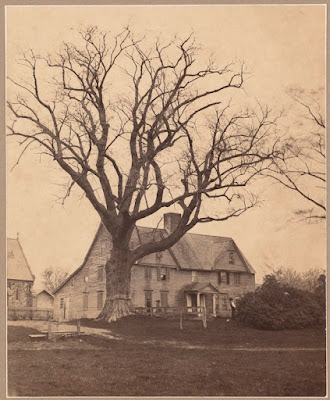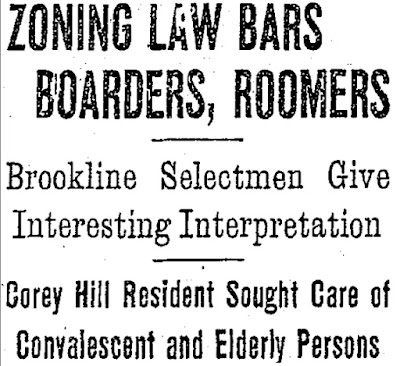 |
| September 18, 1863 (Click image for larger view) |
September 18, 1863 - A Tree Falls in Brookline: The Aspinwall Elm
September 20, 1913 - Francis Ouimet wins U.S. Open
September 21, 1925 - Selectmen bar boarders, roomers
September 20, 1953 - Handwriting controversy in the schools
September 18, 1863
A Tree Falls in Brookline: The Aspinwall Elm
When 19th century Bostonians talked about great elm trees, there were three that usually came to mind: the Great Elm on Boston Common; the Washington Elm on Cambridge Common; and the Aspinwall Elm, towering over the Aspinwall family home in Brookline Village.
 |
| The Aspinwall Elm before 1863 |
Half the tree fell in 1844. Nineteen years later, the rest of the tree came down in a gale, crashing on top of the 200-year old family house and punching a hole in the roof. Three generations of the family posed in front of the house with the toppled tree, as shown at the top of this post.
The loss of the Aspinwall Elm was big news, and not just locally. Word of its demise was mentioned in newspapers as far away as Wisconsin. The Aspinwall House was itself torn down in 1891. The land was acquired by the town in 1914 for a park. Expanded in 1972, it is now the Billy Ward Playground.
September 20, 1913
Francis Ouimet wins U.S. Open
Francis Ouimet, the 20-year old Brookline native, shocked the golfing world when he upset British veterans Harry Vardon and Ted Ray to win the U.S. open at the Country Club in Ouimet's home town.
Francis Ouimet wins U.S. Open
Francis Ouimet, the 20-year old Brookline native, shocked the golfing world when he upset British veterans Harry Vardon and Ted Ray to win the U.S. open at the Country Club in Ouimet's home town.
 |
| Brookline Townsman, September 27, 1913 |
Ouimet, working with 10-year-old caddy Eddie Lowery, tied Vardon and Ray in the final round on September 19th, then won a playoff on the 20th. The upset received national and international attention and spurred local pride as seen in the Brookline Townsman headline above and the following quote from the Brookline Chronicle.
"While we admire his skill in the game, we think the town is particularly to be proud of the sand and nerve he showed in his contest with the two great English players. Not merely as a golfer, but as a man, Ouimet has qualities that promise to be the making of an unusual career."
September 21, 1925
Selectmen bar boarders, roomers
Selectmen bar boarders, roomers
The Board of Selectman issued an interpretation of the town's zoning laws that would prohibit owners or residents of single-family homes from taking in roomers or boarders. The ruling came in response to a complaint that the resident of a house on Corey Hill had advertised rooms for convalescent or elderly people.
 |
| Boston Globe, September 22, 1925 |
The action was taken in to response a petition signed by 45 neighbors of the house at 44 York Terrace, members of the Corey Hill Improvement Association. It blocked the proposed use on that particular house only, though similar action was possible against other residences, reported the Boston Globe.
The Brookline Chronicle decried the ruling. "Imagine an elderly woman, to whom the acceptance of a lodger or roomer might be the sole available means of eking out a small income and so of maintaining her old family home, being advised by the police that such an undertaking was against the law! The idea is preposterous and highly unacceptable."
September 20, 1953
Handwriting controversy in the schools
An ongoing controversy over how handwriting was taught in the Brookline schools reached new levels with a petition from parents calling for more emphasis on cursive writing. Brookline had been focusing on the manuscript, or print, style of handwriting in the lower grades for about 10 years.
Handwriting controversy in the schools
An ongoing controversy over how handwriting was taught in the Brookline schools reached new levels with a petition from parents calling for more emphasis on cursive writing. Brookline had been focusing on the manuscript, or print, style of handwriting in the lower grades for about 10 years.
A group called the Parents Research Committee said it had collected signatures from about one-third of the parents in the school system calling for the change, claiming children could neither read nor write cursive, which the committee called "the one universal common denominator of social communication."
The School Committee argued that the manuscript, or print, form of writing was easier to learn and an important part of learning to read printed text. The controversy was the subject of letters to the editor of the local and Boston papers, many of them supporting the School Committee. In the end, the Committee decided to continue with the existing program, while adding an optional course in cursive beginning in the seventh grade.
These three sisters, daughter of a Brookline firefighter and his wife, were shown in the Boston Globe with examples of their manuscript handwriting.

No comments:
Post a Comment